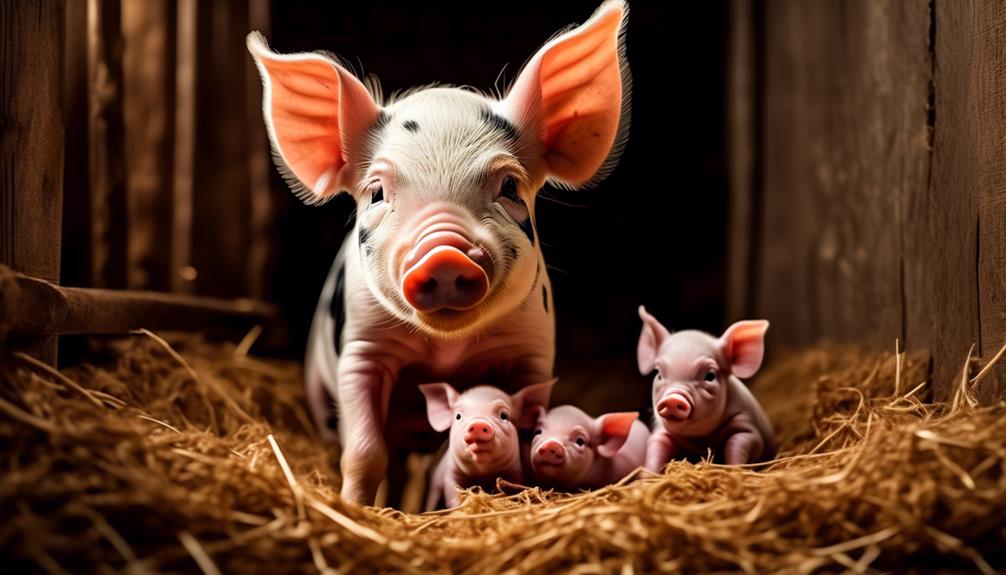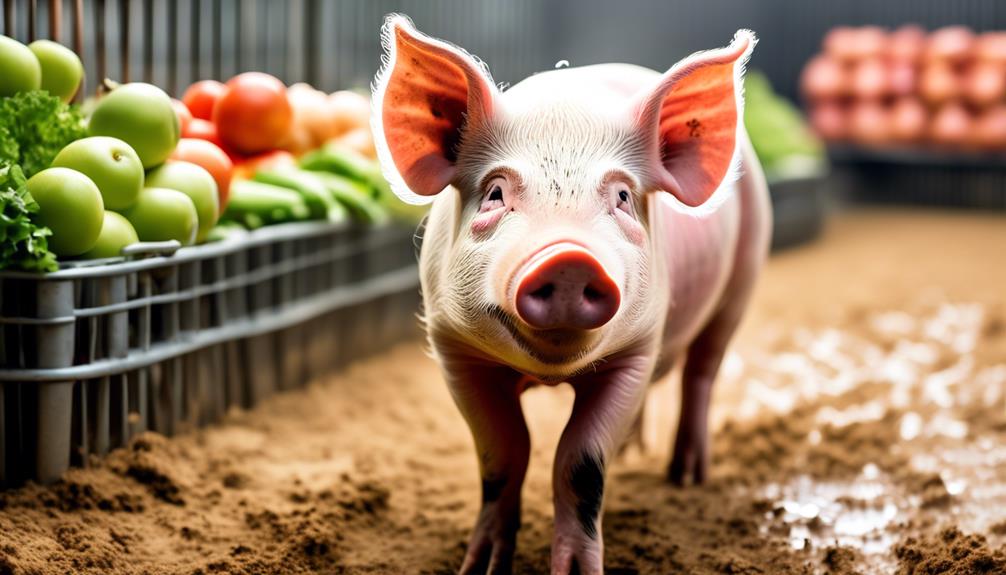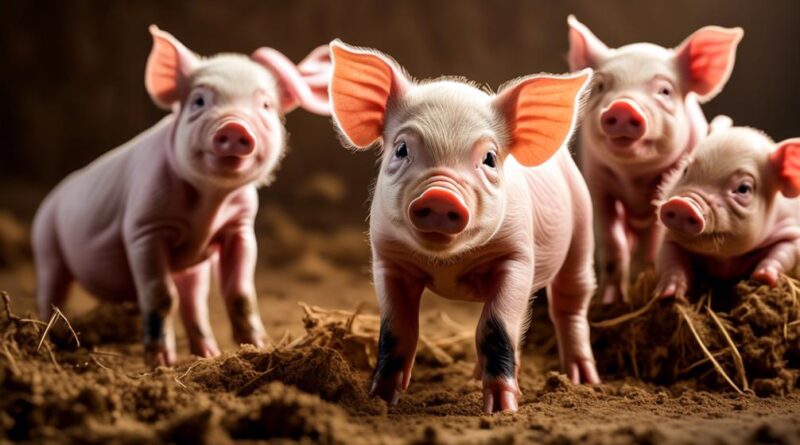Why Do Piglets' Growth Stages Impact Their Health?
As a piglet, life is like a journey through a forest, with each growth stage being a different trail you must navigate. From the neonatal stage where you are just taking your first steps, to the adult stage where you are confidently forging your own path, each stage presents its own challenges and opportunities.
But have you ever wondered how these growth stages impact your health, and why it's crucial to understand this impact? The answer lies in the intricate interplay between physical development, nutritional needs, and disease susceptibility.
Neonatal Stage

As a piglet owner, you'll notice that during the neonatal stage, piglets grow rapidly and require special care to maintain their health and development. Nutritional requirements play a crucial role in the neonatal stage of piglets. Providing a high-quality, easily digestible diet is essential for their growth and development. Piglets have a high nutritional demand due to their rapid growth rate, and it's important to ensure that they receive adequate amounts of colostrum, which contains essential antibodies to support their immune system. Additionally, a well-balanced diet that includes proteins, fats, carbohydrates, vitamins, and minerals is vital for their overall health and growth.
Social interactions also play a significant role in the neonatal stage of piglets. They're highly social animals and thrive in an environment where they can interact with their littermates and sow. Social interactions help in the development of their social skills and reduce the likelihood of aggressive behaviors as they grow older. As a piglet owner, it's important to provide an environment that allows for social interactions while also ensuring that the piglets have access to a warm, dry, and comfortable space for rest.
Weaning Stage
During the weaning stage, piglets typically experience a significant transition in their diet and social interactions. This period marks a crucial phase in a piglet's development, as they're weaned off their mother's milk and introduced to solid food. Meeting the nutritional requirements of piglets during this stage is essential to support their growth and development.
As piglets are introduced to solid food, their nutritional needs shift from solely relying on their mother's milk to a more varied diet that includes grains and other feed. It's important to ensure that the piglets receive a balanced diet that meets their specific nutritional needs to support their growth and overall health.
In addition to the shift in nutritional requirements, the weaning stage also brings about behavioral changes in piglets. They begin to explore their environment more independently and interact with other piglets. This transition can sometimes lead to social stress as piglets adjust to the new dynamics within the group.
Providing a comfortable and safe environment for piglets during this stage is crucial in managing their behavioral changes and ensuring their well-being. Additionally, closely monitoring the piglets' behavior and social interactions can help identify any issues early on and allow for appropriate interventions.
Post-weaning Stage
After weaning, piglets experience a period of adjustment as they adapt to a diet devoid of their mother's milk and become more independent in their social interactions. This post-weaning stage is crucial for the piglets' development, as they transition from a liquid to a solid diet. Nutritional requirements play a significant role during this stage. It's essential to provide piglets with a balanced diet that meets their changing nutritional needs. As piglets are weaned off milk, they need a diet rich in protein, energy, and essential nutrients to support their growth and development. Meeting their nutritional requirements during this stage is vital for ensuring optimal health and growth.
Behavioral changes are also prominent during the post-weaning stage. Piglets start to explore their environment more independently and engage in social interactions with their pen mates. However, this transition can also lead to stress and behavioral challenges, such as aggression and tail-biting. Providing a conducive environment with ample space, enrichment materials, and proper socialization can help mitigate these behavioral issues and support the piglets' mental well-being.
Pre-pubertal Stage
Entering the pre-pubertal stage, piglets undergo significant physiological changes as they prepare for sexual maturity. This stage is crucial for laying the foundation for their future reproductive capabilities and overall health.
Let's take a closer look at the pre-pubertal stage and its impact on piglets' health:
- Hormonal changes: During this stage, piglets experience a surge in hormonal activity, particularly the production of reproductive hormones such as estrogen and testosterone. These hormonal changes play a vital role in preparing the piglets for sexual maturation and fertility.
- Growth hormones: The pre-pubertal stage is characterized by rapid growth, and growth hormones play a pivotal role in this process. These hormones, including growth hormone and insulin-like growth factor, contribute to the development of muscle mass, bone density, and overall body size, setting the stage for healthy adulthood.
- Nutritional requirements: With the increased physiological demands during this stage, piglets require a well-balanced diet rich in essential nutrients to support their growth and development. Adequate nutrition is crucial for ensuring optimal health and reproductive performance in the future.
- Management practices: Proper management during the pre-pubertal stage is essential for ensuring the well-being of piglets. This includes providing a clean and comfortable environment, regular health monitoring, and appropriate handling to minimize stress and promote healthy growth.
Understanding the significance of the pre-pubertal stage is essential for promoting the long-term health and reproductive success of piglets. By addressing their specific needs during this critical period, producers can set the stage for thriving, healthy pigs in the future.
Pubertal Stage
As piglets reach the pubertal stage, their bodies undergo significant hormonal changes, preparing them for sexual maturity and reproductive capability. Hormonal changes during this stage play a crucial role in the piglet's physical and behavioral development. The surge in reproductive hormones triggers a growth spurt, leading to rapid physical changes. This growth spurt is essential for the piglet to attain the size and physical attributes necessary for successful reproduction.
The hormonal changes that occur during the pubertal stage are responsible for the development of secondary sexual characteristics in piglets. These characteristics include changes in body shape, size, and the development of sexual organs. Additionally, hormonal fluctuations influence behavior, as piglets may exhibit signs of increased sexual interest and territorial behavior during this stage.
Furthermore, the growth spurt during the pubertal stage is indicative of the piglet's readiness for breeding. It's a critical period where the piglet's body prepares for the demands of reproduction by increasing in size and reaching sexual maturity. The timing and progression of the growth spurt are essential indicators of the piglet's overall health and future reproductive capabilities.
Pre-adult Stage
During the pre-adult stage, piglets continue to experience significant physical and behavioral changes as they progress towards full maturity. This stage is crucial for setting the foundation for their health and development. Understanding and addressing their nutritional needs and growth monitoring during this stage are essential for ensuring optimal piglet health and well-being.
- Nutritional Needs: As piglets enter the pre-adult stage, their nutritional requirements change. They need a balanced diet that supports their growth and development. Providing the right mix of proteins, carbohydrates, vitamins, and minerals is vital during this stage to support their increasing energy demands and overall growth.
- Growth Monitoring: Monitoring the growth of piglets during the pre-adult stage is imperative. Regular assessments of their weight, height, and body condition help in identifying any growth abnormalities or health issues early on. This allows for timely interventions and adjustments in their diet or management practices to ensure healthy development.
- Behavioral Changes: During this stage, piglets exhibit various behavioral changes as they become more independent and explore their surroundings. Understanding and adapting to these behavioral changes is crucial for providing them with a conducive environment for growth.
- Health Management: The pre-adult stage is a critical period for establishing good health practices. Vaccinations, parasite control, and overall health monitoring should be diligently carried out to prevent diseases and ensure the well-being of the piglets as they transition into adulthood.
Addressing these aspects during the pre-adult stage lays the groundwork for ensuring the long-term health and productivity of the piglets.
Adult Stage

Focusing on the foundation laid during the pre-adult stage, piglets at the adult stage require continued attention to their nutritional needs and health management for sustained well-being and productivity.
As piglets transition into adulthood, their nutritional requirements evolve significantly. It's crucial to provide a balanced diet that meets their specific needs, considering factors such as weight, size, and reproductive status. Adequate protein, vitamins, and minerals are essential to support their growth, overall health, and reproductive performance.
Additionally, monitoring their health becomes even more critical at this stage. Regular veterinary check-ups, vaccinations, and parasite control are paramount for disease prevention and early intervention. Health monitoring also involves observing their behavior, appetite, and overall condition to detect any signs of illness promptly.
Furthermore, maintaining a suitable living environment with proper ventilation, hygiene, and space is essential for minimizing stress and preventing diseases.
Your vigilance in managing the nutritional requirements and health of adult piglets will directly impact their well-being and productivity. By ensuring that they receive the necessary nutrients and medical attention, you contribute to their longevity, reproductive success, and overall quality of life.
Geriatric Stage
Entering the geriatric stage, piglets will require specialized care and attention to maintain their health and well-being. This stage marks a crucial period in a piglet's life, and understanding their unique needs is essential for ensuring a high quality of life.
Here are some key factors to consider during this stage:
- Nutritional requirements: As piglets age, their nutritional needs change. It's important to adjust their diet to accommodate these changes. Ensure that they're receiving a balanced diet that meets their specific needs, including essential vitamins and minerals to support their overall health.
- Health monitoring: Regular health check-ups become even more critical during the geriatric stage. Keep a close eye on their weight, mobility, and overall condition. Look out for signs of arthritis, dental issues, or any other health concerns that may arise as they age.
- Environmental considerations: The geriatric stage may require adjustments to their living environment. Providing comfortable and supportive bedding, as well as ensuring easy access to food and water, can significantly impact their well-being.
- Exercise and mental stimulation: While geriatric piglets may not be as active as their younger counterparts, it's still important to encourage gentle exercise and mental stimulation to keep them engaged and maintain their overall health.
Frequently Asked Questions
How Do Piglet Growth Stages Impact Their Long-Term Reproductive Health?
As piglets grow, their long-term fertility can be influenced by various factors.
The interaction between growth hormones and reproductive maturity plays a crucial role in determining their hormone balance. This delicate balance during growth stages can impact their long-term reproductive health, potentially affecting their ability to produce healthy offspring later in life.
Understanding these connections is essential for ensuring the overall well-being and productivity of pig herds.
Can the Growth Stages of Piglets Affect Their Susceptibility to Certain Diseases or Health Conditions Later in Life?
As piglets grow, their early nutrition and immunity greatly impact their long-term health. The growth stages play a crucial role in determining their susceptibility to various diseases. Proper nutrition and care during these stages can significantly reduce the risk of health issues later in life.
It's essential to provide adequate support during these critical growth periods to ensure the piglets' overall health and disease resistance in the future.
Are There Specific Nutritional Requirements That Are Crucial During Each Growth Stage to Ensure Optimal Health?
During each growth stage, piglets have specific nutritional requirements crucial for optimal health. The right balance of nutrients supports their development and long-term reproduction. Meeting these needs ensures that they grow into healthy adult pigs.
Failing to provide adequate nutrition at each stage can impact their overall health and susceptibility to diseases later in life. Therefore, understanding and meeting their nutritional needs during growth stages is essential for maintaining their health.
What Impact Do Stressors or Environmental Factors Have on the Growth and Development of Piglets at Each Stage?
Environmental stressors, such as temperature fluctuations and overcrowding, can affect the growth and development of piglets at each stage. These stressors can impact the release of growth hormones and disrupt social interactions, leading to stunted growth and health issues.
It's crucial to provide the right nutritional requirements to support piglets during these critical stages, as they're more susceptible to the negative effects of environmental factors.
How Do the Growth Stages of Piglets Influence Their Overall Behavior and Social Interactions Within a Herd?
As piglets grow, their behavioral development and social dynamics within a herd are influenced. During early stages, they learn social cues and establish hierarchies, impacting their future interactions.
As they mature, their behavior and social interactions continue to evolve, shaping their place within the herd. These stages are crucial for developing social skills and adapting to the dynamics of the herd, ultimately impacting their overall behavior and interactions.
Conclusion
So, as you can see, piglets' growth stages have a significant impact on their overall health.
It's important to understand the specific needs and challenges that each stage presents in order to ensure the best possible care for these animals.
By recognizing the unique requirements of each growth stage, we can better support the health and well-being of piglets throughout their development.
